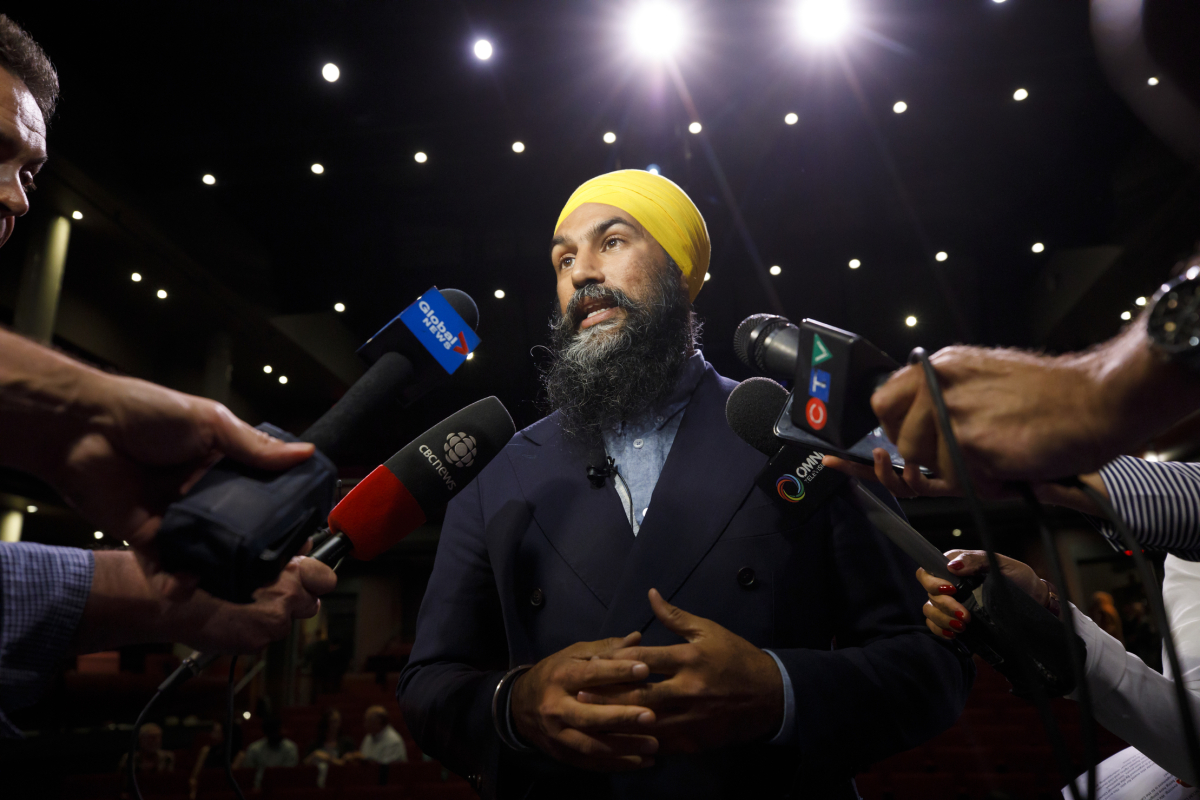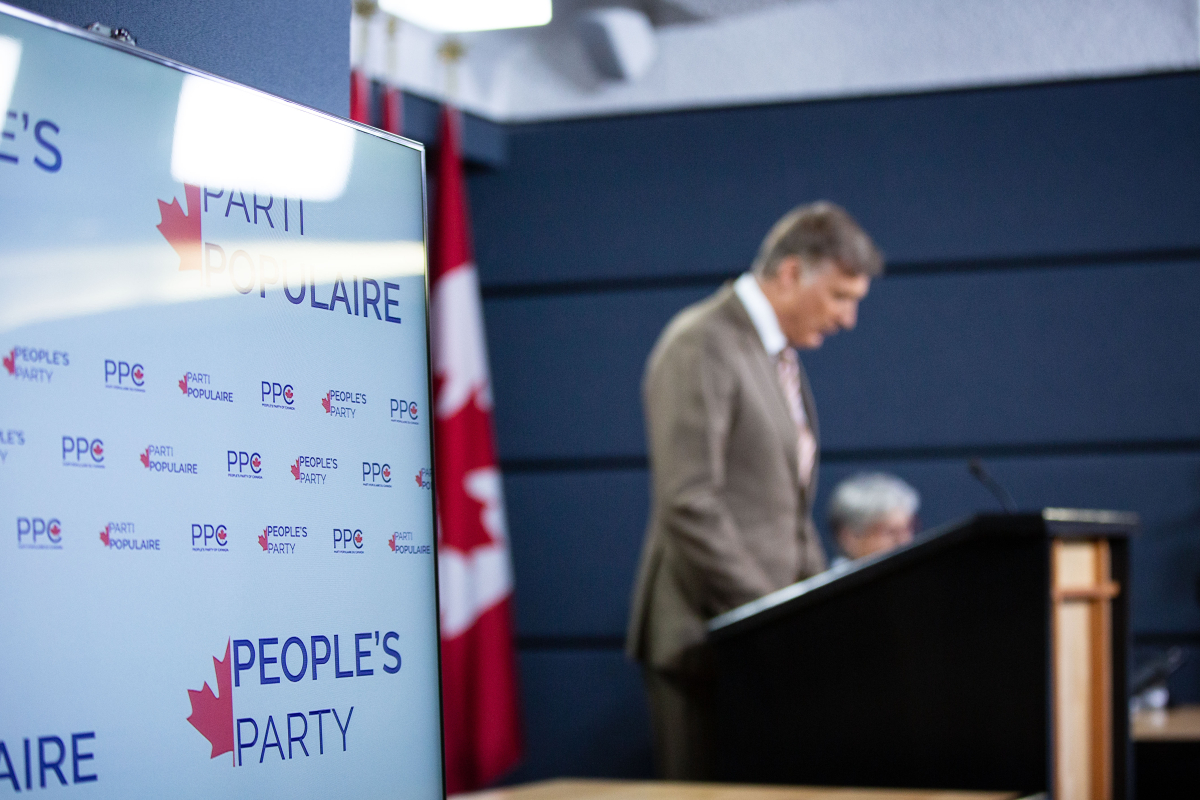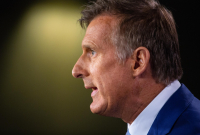Support strong Canadian climate journalism for 2025
Justin Trudeau's first four years as prime minister are officially coming to a close and it remains to be seen whether he and his government have done enough to be re-elected to office for a second shot at governing.
The Canadian political landscape looks vastly different from the promises of sunny ways that brought Trudeau to power. Here is a cheat sheet for the last four years:
Trudeau vs. Trump: every twitch and grunt
Canada’s relationship with the United States was famously described by Justin Trudeau’s father in 1969 as “sleeping with an elephant” — no matter how friendly the beast, one is nevertheless “affected by every twitch and grunt.” Donald Trump has proven to be the twitchiest and the gruntiest.
Trump stunned the world when he swept into office in 2016. From the beginning, Canadians wanted to know if Trudeau could assert himself with this brash real estate developer, a man who had called Mexicans rapists, bragged about grabbing women by the genitals and called for a travel ban on Muslims before getting elected.
Trudeau visited Trump at the White House in early 2017 and the two "affirmed their longstanding commitment to close co-operation" in a statement. But then Trump, who had already called NAFTA “the worst trade deal in history” on the campaign trail, ordered his administration to move forward with renegotiations. The U.S. issued big demands later in 2017, setting up Trudeau to declare he was “pushing back” a few months later, a move that was followed by the U.S. slapping tariffs on metals exports.
By the time Trudeau hosted Trump and other G7 leaders in Quebec in June 2018, the trade dispute was starting to turn nasty. Trump blew up the summit in a tweet after jetting off early, insulting the prime minister from Air Force One as a “dishonest” and “weak” man for the crime of standing up against the tariffs.

Canada made concessions in the new deal, USMCA, on auto imports, signing a provision restricting the country to 2.6 million passenger vehicle exports to the U.S. tariff-free, well above current levels. Canada also opened up a slice of its protected dairy market.
The fate of the deal is still uncertain. Canada's ratification of the deal wasn't passed by Parliament before it was dissolved Wednesday in preparation for the election, meaning the next Canadian government will have to pick up the project.
A wave of Tory blue across Canada
When Trudeau was first elected, an NDP government was in power in the country’s largest oil-producing region in Alberta, while a Liberal government was in charge in Canada’s most populous province, Ontario. Since then, a wave of Tory blue has swept across the country frustrating the prime minister’s attempts to align with the provinces and achieve his political goals.
In 2016, Brian Pallister’s Progressive Conservatives in Manitoba ended almost two decades of NDP government there. In June 2018, Doug Ford’s Progressive Conservatives were elected in Ontario, setting up the first right-of-centre government in the province since the early 2000s. That was followed by Quebec Premier François Legault’s right-leaning Coalition Avenir Québec winning in October 2018. Also that year, in New Brunswick, Blaine Higgs’ Progressive Conservatives were sworn in after defeating the Liberal government in a non-confidence vote.
This spring, Jason Kenney’s United Conservative Party swept to power in Alberta, while Dennis King’s Progressive Conservatives have come to power in Prince Edward Island. Meanwhile, Pallister has just successfully held on to his Tory government in Manitoba.
Many of the true-blue premiers are fighting Trudeau over a law requiring them his attempt to put a price on pollution, and have created a very different political landscape for the federal election.
The major premier bucking the trend? Premier John Horgan's BC New Democratic Party, which won power from the right-leaning B.C. Liberals in British Columbia in 2017, with the support of the Green Party there. But shared progressive orientation hasn’t prevented rancour: Trudeau and Horgan have clashed over Horgan’s opposition to the Trans Mountain pipeline expansion project.

The Trans Mountain pipeline saga
When Justin Trudeau signed off on the Trans Mountain and Line 3 pipelines in 2016, he called it a "major win for Canadian workers, for Canadian families and the Canadian economy, now and into the future." He probably didn't realize how much of a headache it would be for his government and the Liberal Party in the years to come.
Through National Observer’s reporting, the Canadian public now knows that, at least a month before the pipeline was approved, a high-ranking public servant was thinking about how to give cabinet "a legally sound basis to say ‘yes’” to Trans Mountain. This was occurring even as the government said it was consulting with First Nations and hadn't come to a decision. Other public servants told National Observer how stunned they were to be given such direction.
National Observer also uncovered documents showing how the government had caught Kinder Morgan, the pipeline proponent, breaking environmental rules but ignored the penalties as it began construction. A movement in British Columbia started to oppose construction of the pipeline expansion. Behind-the-scenes negotiations began to drive the government towards taking over the project by buying it with billions of dollars in public money.

Soon after, Trudeau faced new headaches as the Federal Court of Appeal quashed the approval of Trans Mountain, even as Kinder Morgan executives were cashing out with millions in stock options and bonuses. The court ruling said Trudeau’s cabinet made its decision without considering all evidence and failing in its legal duty to consult First Nations. It sent the government back to the drawing board.
What followed was a fresh attempt by the Trudeau Liberals to conduct meaningful consultations with First Nations, which led to a second approval by Cabinet this June. But that second attempt is still being questioned, and the pipeline’s fate remains uncertain.
An attempt at reconciliation
It started with a great big promise: “a total renewal of the relationship between Canada and Indigenous peoples.”
Over the last four years, Trudeau has repeated that no relationship is more important to him than that with Inuit, Métis and First Nations. His government has worked toward restoring self-governance practices and implementing the Truth and Reconciliation Commission’s recommendations. It passed Indigenous languages legislation and worked to fix child welfare jurisdictional issues. The national inquiry into missing and murdered Indigenous women and girls (MMIWG) also found that centuries of policy and failures amount to "colonial genocide.”
But the Crown’s fundamental relationship with Indigenous peoples continued to bedevil the government. Despite efforts to create a rights and recognition framework, the Liberals failed to deliver on this crucial new pathway toward self-determination.

Some Treaty Nations said they rejected the Indigenous framework because it did not follow Free Prior and Informed Consent, a right recognized in the United Nations Declaration on the Rights of Indigenous Peoples.
Still, Trudeau travelled to the North more than any of his predecessors to announce investments in housing, health, infrastructure and conservation. The prime minister also apologized for Canada's removal of sick Inuit from their homes in the 20th century, and exonerated historical figures who were betrayed long ago by the Canadian state, like Cree Chief Poundmaker and six Tsilhqot'in warriors who were invited to peace talks but then arrested and hanged in 1864.
There have also been controversies, the pipeline-consultation failure among them. NDP MP Romeo Saganash in September 2018 asked Trudeau in Question Period why he wouldn’t just “say the truth and tell Indigenous peoples that he does not give a fuck about their rights?” (Trudeau was not in the House at the time.) And a group of First Nations is fighting the Trans Mountain expansion in court. Trudeau and his government are the first to acknowledge that more work needs to be done.

As of Sept. 3, 2019, the government says 87 long- term drinking water advisories have been lifted since the Liberals took office in November 2015; 56 remain. The government promises to lift all of them by March 2021. Other statistics are significant: the MMIWG inquiry showed Indigenous women are 12 times more likely to go missing or be murdered than other women in Canada.
Around 47 per cent of children with First Nations status live in poverty, which is more than two and a half times the national average. And the annual rate of tuberculosis among Inuit is a stunning 290 times higher than the rate among non-Indigenous Canadians, according to a 2018 study by the Public Health Agency of Canada.
The Liberal environmental plan
The bold foundation of Trudeau’s plan to reduce Canada’s contribution to the climate crisis — a progressive price on carbon pollution — was implemented on April 1, 2019.
The levy punctuated four years of widespread action items aimed at meeting Canada’s Paris agreement: phasing out coal power, cleaner fuel rules, funding for new green infrastructure like light rail and electric-vehicle charging stations, and other oil and gas sector restrictions. They calculated that this will result in pollution dropping to 592 million tonnes, compared to increasing to 815 million tonnes under Canada’s 2015 projections.
Bill C-69, a major overhaul of the federal environmental-assessment regime, triggered fierce backlash from conservative politicians and the oil and gas sector. Parliamentary Budget Officer Yves Giroux delivered a report suggesting Canada would need to impose additional taxes on carbon on top of its current plan to reach its 2030 target, if the carbon tax were the single, solitary tool used to reduce pollution.
This spring, Canadian government scientists published a major report showing how climate change was affecting the country nationwide, from intensifying urban flooding and heat waves to rising sea level on the coasts, threatening freshwater and marine ecosystems and other consequences. The report said Canada is heating up at double the average rate of the planet.
In June the government passed a motion proclaiming climate change a national emergency. But Trudeau could not be in the House for the vote — he was attending the Raptors’ championship parade in Toronto. The next day, the Trans Mountain Pipeline was greenlit.
Jagmeet Singh becomes NDP leader
Jagmeet Singh’s meteoric rise to the top of the New Democrats was described at the time as an unstoppable “juggernaut.” Canada’s first racialized federal political leader and candidate for prime minister, won the NDP leadership race on Oct. 1, 2017, beating out more experienced contenders and igniting a groundswell of excitement.
But Singh soon faced a very Canadian problem: he had no seat in the House of Commons and so could not engage in the daily, TV-worthy cut and thrust that goes on inside that political theatre.
It would take until 2019 before Singh could win a byelection and take his seat in the House. Throughout, he has struggled to shine on the national stage. A recent poll had the NDP falling to fourth place behind the Greens despite the party still controlling the third-most seats. Singh has his work cut out for him.

Trudeau’s private island vacation
"Let me just try to reorder the thoughts," a flustered Trudeau told reporters on Parliament Hill on Dec. 20, 2017.
He was attempting to respond to the findings of the ethics commissioner, who had said Trudeau contravened the Conflict of Interest Act when he vacationed on the Aga Khan's private island while also having “ongoing official dealings” with the spiritual leader.
Trudeau said he had always considered the Aga Khan a family friend, but he promised to clear family vacations in future. The plot thickened when, after the lobbying commissioner found there wasn’t any basis for a complaint, a federal judge ordered that office to take another look. The opposition Conservatives have since called on the RCMP to look into the whole thing.
A trip to India creates controversy
The picture of Justin Trudeau and his family in traditional Indian clothes during a February 2018 trip to the subcontinent is now a key image related to his government’s colourful four-year history — but not in the way the prime minister may have hoped.
First, Trudeau’s family was criticized — and then mocked — for leaning too heavily on “Bollywood-style” clothing during the trip. But the headlines really started coming when it was revealed that Jaspal Atwal, who was convicted of the attempted murder of an Indian cabinet minister in 1986, posed with Trudeau’s wife, Sophie Grégoire-Trudeau, at an event in Mumbai.
Atwal was also invited to dine with the prime minister at a second event before that was shut down. Trudeau’s then-national security adviser Daniel Jean took much of the heat that spring for the incident, after suggesting “rogue elements” were behind the shellacking of the PM and warning of “information warfare.” Jean retired soon after, although that was planned before the controversy hit.
Canada's new federal People’s Party
Former federal Conservative cabinet minister Maxime Bernier wanted to be the leader of his party, after his boss, former prime minister Stephen Harper, quit the scene following their defeat in 2015 at the hands of the Liberals.
Bernier lost the leadership vote to Andrew Scheer by a minuscule 1.9 per cent margin. In the ensuing months, he grew disillusioned and finally announced on Aug. 23, 2018, that he was quitting to launch a new party of his own. The Conservatives, he said, had grown “too intellectually and morally corrupt to be reformed.”
The next month he unveiled his new baby: The People’s Party of Canada, described by Bernier as “a coalition of people who are disenchanted with traditional politicians who say one thing one day and the other the next.” The party, he said, was to be an advocate for “smart populism.”

Bernier launched the People’s Party soon after gaining attention on social media for his long denunciation of “ever more diversity” in Canada. He has consistently attacked Canada’s mainstream approach to immigration. He has also rejected mainstream atmospheric science proving global heating and a recent report shows his candidates spreading false information.
Scheer struggles to denounce racism
Scheer has faced blowback on several occasions over the past year for his failure to adequately denounce racism and white supremacy. In February, he appeared at a “convoy” in Ottawa that was officially billed as raising awareness for the oil and gas industry, and opposing Trudeau government environmental policies. But anti-immigrant voices were undeniably part of the scene. Facing criticism for failing to denounce these voices in the crowd, Scheer defended himself by saying he was there to speak to the oil workers.
In March, he was called out again after his initial statement in response to the deadly Christchurch mosque shootings failed to mention Muslims. Then, in June, he faced controversy for his failure to remove Conservative MP Michael Cooper from caucus after Cooper read out the Christchurch shooter’s manifesto in a justice committee hearing, prompting Trudeau to comment that “there is an awful lot of room for intolerance" in Scheer’s Conservative party.
The SNC-Lavalin affair explodes
An ethical grey cloud has been hanging over Parliament Hill since February when The Globe and Mail published a stunning report alleging the Prime Minister’s Office had urged then-attorney general Jody Wilson-Raybould to help the Quebec engineering and construction giant avoid criminal prosecution.
In the months that followed, Trudeau denied many of the claims, even as his principal secretary and close friend Gerald Butts resigned (only to reappear inside Liberal headquarters in time for the campaign). Meanwhile, Wilson-Raybould quit cabinet soon after the story broke, before giving explosive testimony to committee about the whole affair. She was eventually kicked out of the party and is now defending her Vancouver—Granville seat as an independent.

Trusted cabinet minister Jane Philpott also resigned over the matter and is also running as an independent in Markham—Stouffville.
Trudeau continues to admit to no wrongdoing other than a misread of the situation, saying he did it to save Canadian jobs, despite the fact that the federal ethics commissioner found Trudeau’s actions amounted to his second violation of the Conflict of Interest Act.
And right before the election campaign officially kicked off on Sept. 11, The Globe and Mail published another bombshell: that the government's refusal to release further cabinet secrets may have “stymied” the RCMP from fully examining the SNC-Lavalin case for possible obstruction of justice.
Trudeau and the Liberal Party are entering the election period with some wins and a lot of baggage, but the road isn’t easy for the remaining parties, either. Canadians politics has shifted on its axis these four years and some Canadian voters have become more distrustful of their governments and their actions.
All four major parties have an uphill battle in winning votes — perhaps none more so than the Trudeau Liberals who are set to redefine themselves from their once sunny ways.







Comments
How do you not mention electoral reform? How do you not mention the ERRE committee, which toured the country talking to citizens and political experts (at a cost of millions of dollars to the taxpayer), in the end recommending the implementation of proportional representation? How do you not mention that Justin Trudeau then decided to throw the whole thing in the garbage, largely because his preferred system was not the one chosen?
This is indeed a cheat sheet--in the sense that it cheats the reader.
EXACTLY!
Indeed!
How do you not mention Ms May of the Green Party of Canada? !@!!!
When MP Rona Ambrose was interim leader of the Conservatives - she was on a yacht in the Caribbean owned by Calgary billionaire and oil tycoon Edwards - while Trudeau was on Aga Khan's yacht. Isn't that was more of a conflict of interest - as oil profiteers financially benefit more than organizations like the Aga Khan Foundation who contribute to charitable causes?
This relevant fact has been ignored by the media tipping bias against Trudeau.